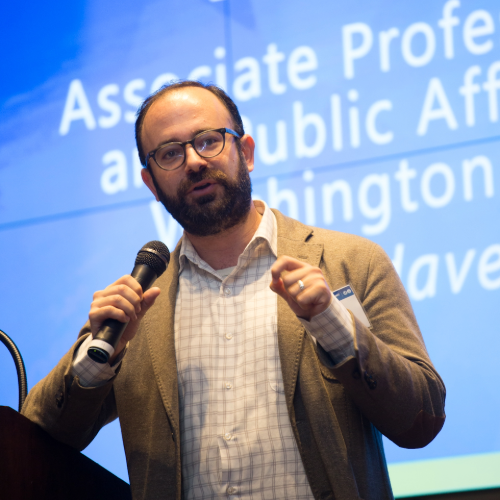Parsing the Political Project of Techno-Optimism
Dave Karpf / Dec 19, 2023
Luke Conroy and Anne Fehres & AI4Media / Better Images of AI / Models Built From Fossils / CC-BY 4.0
As most readers of Tech Policy Press are already aware, Andreessen Horowitz (a16z) is one of Silicon Valley’s most influential venture capital firms. It is named after its cofounders, Marc Andreessen and Ben Horowitz.
Two months ago, Andreessen published his “techno-optimist manifesto” on the company’s website. The manifesto has been widely ridiculed (including by yours truly), but has also served as a Silicon Valley shibboleth. Andreessen and his colleagues are rich enough that they don’t need their manifestos to be rhetorically persuasive on the merits. If his writing has the rhythm of an extended social media thread, developed via group text, that hardly dampens its impact. If his reasoning is farcically self-contradictory, so what? This is where he and his peer network stand. If you want access to their resources, you know what positions to adopt.
One of the many bits of his manifesto that I found instantly underwhelming was the section on politics. Andreessen writes:
“Techno-Optimism is a material philosophy, not a political philosophy. We are not necessarily left wing, although some of us are. We are not necessarily right wing, although some of us are. We are materially focused, for a reason – to open the aperture on how we may choose to live amid material abundance.”
(This is in a section labeled, for no particular reason, “the meaning of life.” Editing is not Andreessen’s strong suit.)
This statement is ludicrous. Techno-optimism has always been a narrowly political ideology, one that clothes itself in neutral garb. It is not narrowly political in the partisan sense, but in the policy-demanding sense. Dating at least back to the “Californian Ideology” that dominated 90s tech culture, techno-optimists believe that the future is best left in the hands of entrepreneurs, investors, and engineers, and therefore governments should stay out of their way. The political project of techno-optimism holds that financial gains from venture capital should be as-close-as-possible to untaxed, and that VC investment portfolios should be as-close-as-possible to unregulated.
Last week, Ben Horowitz published another piece on the company’s website, “politics and the future.” It declares that the company:
“...will, for the first time, get involved with politics by supporting candidates who align with our vision and values specifically for technology. (…) [W]e are non-partisan, one issue voters: if a candidate supports an optimistic technology-enabled future, we are for them. If they want to choke off important technologies, we are against them.”
At least, I suppose, they are doing us the favor of saying the quiet part out loud?
It isn’t immediately clear what is new about this announcement. Andreessen and Horowitz seem to enjoy being the center of attention, and there is a certain look at meeeee quality to both of these company blog posts.
Marc Andreessen has a long history of political donations. Ben Horowitz is the son of famed conservative gadfly David Horowitz. They have sent no signal regarding how much they intend to spend in the 2024 election. They could be gearing up to fill the hole left by Peter Thiel and Sam Bankman-Fried (who are each sitting out the 2024 election cycle for… different reasons). Or they might just be angling for attention.
But, more importantly, this is just a new coat of techno-optimist paint on the most common type of corporate behavior. A large company has declared that it intends to donate money to candidates who help its investment portfolio succeed, and will back challengers to candidates who support policies that might undermine its investments. Show me a corporate PAC whose donations don’t follow that pattern.
There’s a bit of additional comedy here, because Andreessen’s manifesto also signals out regulatory capture as one of their “enemies.” Horowitz’s blog post insists that there are plenty of appropriate regulations for artificial intelligence, Web3/blockchain technologies, and biotech. Read between the lines and the message is clear: ‘Our investment portfolio is off-limits, but our investments’ competitors sure might be crossing the line.’ (I suppose it’s only regulatory capture when someone else is benefiting from it.)
And, mind you, this is an investment portfolio that includes companies like Civitai, an online marketplace for sharing AI models. An investigation by 404 Media last month found that Civitai has introduced a “bounties” program, allowing users to be paid to create nonconsensual deepfake pornography. You may think that one of the looming threats posed by synthetic media is the avalanche of such material it is poised to unleash. But that isn’t a very optimistic line of thought, and it is logical to conclude that it is the position of a16z that legislators and regulators ought to think about something else instead.
It is also an investment portfolio that includes a dizzying amount of Web3 investments. a16z was one of the largest investors in, and loudest proponents of, the online game Axie Infinity, for instance. Many critics looked at Axie Infinity’s “play-to-earn” model and said “uh, yeah, that’s obviously a ponzi scheme.” But that wasn’t very optimistic of the critics. And sure, today, it is remembered as a colossal ponzi scheme that seriously harmed thousands of people in the Philippines who bought the sales pitch. But Horowitz would like potential candidates to know that these web3 investments “will create a fairer, more inclusive economy than the centralized, monopoly-enabling technologies of web 2 and the industrial-era financial system. Still, we need clear regulation to eliminate bad actors exploiting the technology for nefarious purposes.”
The reality is that legislators (both in the US and around the world) are taking a more critical look at the companies a16z invests in not because they have turned pessimistic, but because they have been paying attention. Marc Andreessen and Ben Horowitz became billionaires by driving up the value of their investment portfolios while warding off regulatory scrutiny. It’s a neat trick, and it has enriched them personally. But it has been a bad deal for the rest of us.
Techno-optimism has been the dominant approach to Silicon Valley’s network of investors and entrepreneurs for the past three decades. They have said “trust us, we’re building the future,” and we have largely gone along with it.
Andreessen’s manifesto posits that techno-optimism has fallen on hard times, and manages to place blame on everyone but himself. Horowitz has now announced that they’ll spend heavily to regain their favored regulatory status. His idea appears to be to go back to the laissez-faire environment of the 1990s.
The reality is that a16z would be better off focusing on cleaning up its own investment portfolio. If its partners make a commitment to pick some companies whose business models don’t rely on crypto ponzi schemes or nonconsensual deepfakes or other harms to people and the planet, they’ll have much less to fear. If Andreessen and Horowitz choose to support tech companies that actually build a future that is better for everyone, they might find the ideology of techno-optimism is a much easier sell.
Authors
